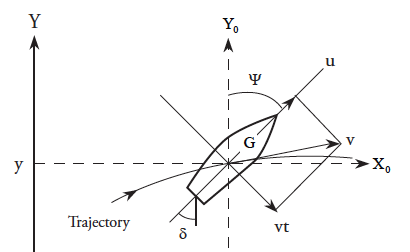Generating fuzzy autopilot for ship maneuvering
DOI:
https://doi.org/10.25043/19098642.55Keywords:
ship maneuvering, heading control, fuzzy identification, intelligent controlAbstract
This paper introduces a method to generate autopilots for ship headings by using issues from the observation of control actions performed by human operators. The controller is designed based on fuzzy logic and uses triangular membership functions for the antecedent and consequent functions for Singleton type. For an automatic adjustment of the consequential, the recursive least squares method was used. This method is used to generate and validate the course driver of a 350-m tanker, at different load conditions.
Downloads
References
AMERONGEN J., Adaptive steering of ship. A model reference approach to improved manoeuvering and economical course keeping. Ph.D. thesis, Delft University of Technology, the Netherlands. 1982.
ÅSTRÖM K.J. AND WITTENMARK B. Adaptive Control. Reading, MA: Addison Wesley. 1989.
BABUSKA, R. Fuzzy and Neural Control. Disc Course Lecture Notes. Delft University of Technology. Delft, the Netherlands. 2001.
CHAE, Y., OH, K., LEE, W. AND KANG, G.. “Transformation of TSK fuzzy system into fuzzy system with singleton consequents and its application”. IEEE International Conference on Fuzzy Systems. IEEE Computational Intelligence Society, Vol. 2,. pp.: 969-973. 1999.
CONTRERAS, J., MISA, R., MURILLO, L. “Obtención de Modelos Borrosos Interpretables de Procesos Dinámicos”. RIAI: Revista Iberoamericana de Automática e Informática Industrial, vol. 5, No. 3, pp. 70-77. Jul. 2008.
CONTRERAS, J., MISA, R., MURILLO, L. “Interpretable Fuzzy Models from Data and Adaptive Fuzzy Control: A New Approach”. IEEE International Conference on Fuzzy Systems. IEEE Computational Intelligence Society. pp.: 1591-1596. Jul. 2007.
DU, J., GUO, CH. “Nonlinear Adaptive Ship Course Tracking Control Based on Backstepping and Nussbaum Gain”. Proceeding of the 2004 American Control Conference Boston, Massachusetts, pp. 3845-3850, July, 2004.
ESPINOSA, J. VANDEWALLE, J. Constructing Fuzzy Models with Linguistic Integrity from Numerical Data-Afreli Algorithm, IEEE Trans. Fuzzy Systems, Vol. 8, No. 5, pp. 591 – 600. Oct. 2000.
ESPINOSA, J., VANDEWALLE, J., WERTZ, V., Fuzzy Logic, Identification and Predictive Control. Springer. USA. 2005.
FOSSEN, T. I. “Marine Control Systems. Guidance, Navigation, and Control of Ships, Rigs and Underwater Vehicles”. Marine Cybernetics. Trondheim, Norway. 2002.
TZENG, CH-Y., CHEN, J.F. “Fundamental Properties of Linear Ship Steering Dynamic Models”, Journal of Marine Science and Technology, Vol. 7, No. 2, pp. 79-88. 1999.
WITKOWSKA, A., SMIERZCHALSKI, R., “Nonlinear Bacsteeping Ship Course Controller”, R&RATA, vol, 1, No. 2, pp. 147-155. Jun. 2008.
WITKOWSKA, A., TOMERA, M., SMIERZCHALSKI, R., “A Bacsteeping Approach to Ship Course Control”, Int. Journal Appl. Math. Comput. Sci., Vol. 17, No. 1, pp. 73–85, 2007.
PASSINO, K, Y YURKOVICH, S. Fuzzy Control. Addison-Wesley. California. (pp. 301-390). 1998.
PEDRIYCZ, W. Why Triangular Membership Functions?”, IEEE Trans. Fuzzy Sets and System, vol. 64, pp.21-30, 1994.

Published
How to Cite
Issue
Section
License
The authors who publish in this Journal certify that:
- The work submitted for publication in The Ship Science and Technology journal, was written by the author, given that its content is the product of his/her direct intellectual contribution.
- All data and references to material already published are duly identified with their respective credits and are included in the bibliographic notes and quotations highlighted as such.
- All materials submitted for publication are completely free of copyrights; consequently, the author accepts responsibility for any lawsuit or claim related with Intellectual Property Rights thereof, Exonerating of responsibility to The Science and Technology for the Development of Naval, Maritime, and Riverine Industry Corporation, COTECMAR.
- In the event that the article is chosen for publication by The Ship Science and Technology journal, the author state that he/she totally transfers reproduction rights of such to The Science and Technology for the Development of Naval, Maritime, and Riverine Industry Corporation, COTECMAR.
- The authors retain the copyright and transfer to COTECMAR the right of publication and reproduction of the work which will be simultaneously subject to the Creative Commons Attribution License (CC -BY) , which allows the license to copy, distribute, display and represent the work and to make derivative works as long as it recognizes and cites the work in the manner specified by the author or licensor.
- For more information about the Creative Commons Attribution License (CC -BY) and his use and scope, please visit the following web page https://creativecommons.org/licenses/by-sa/4.0/legalcode








